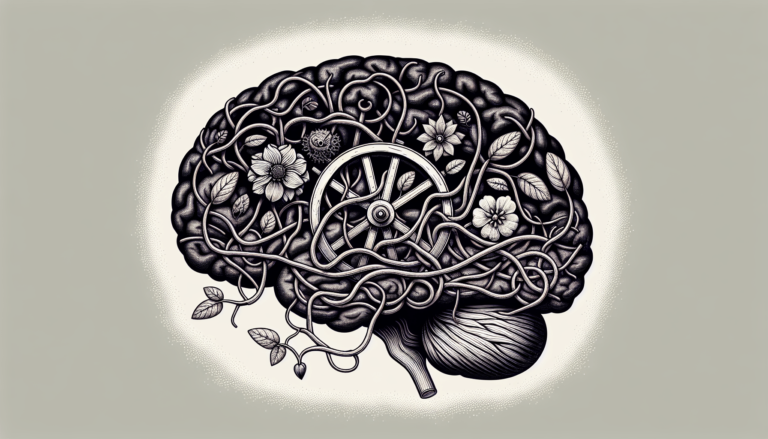The Impact Of Positive Role Models In Our Lives
Have you ever stopped to think about the role models in your life and how they have influenced you? Positive role models can have a profound impact on shaping our values, beliefs, and behaviors. Whether it’s a parent, teacher, celebrity, or mentor, these individuals inspire and guide us towards becoming the best versions of ourselves. In this article, we will explore the incredible power of positive role models and how their influence can shape the course of our lives.

1. Inspiration to Achieve Goals
Setting Higher Standards
Having positive role models in your life can inspire you to set higher standards for yourself. When you see someone who has achieved great things and overcome challenges, it motivates you to aim higher and push yourself beyond your comfort zone. Their success serves as a beacon of hope, reminding you that anything is possible with hard work and dedication.
Motivation to Work Hard
Positive role models can provide the motivation you need to work hard towards your goals. They embody qualities such as discipline, determination, and perseverance, which can inspire you to adopt the same work ethic. Whether it’s watching a successful athlete train relentlessly or witnessing a dedicated teacher go above and beyond for their students, these role models can ignite a fire within you to give your best effort in everything you do.
Overcoming Challenges
One of the most valuable lessons you can learn from positive role models is how to overcome challenges. They can share their stories of struggle and triumph, offering valuable insights and strategies on how to navigate obstacles in life. By observing their resilience and tenacity, you can gain the confidence to face your own challenges head-on and persevere through difficult times. Having a positive role model who has conquered adversity can remind you that you are capable of doing the same.
2. Development of Positive Character Traits
Building Self-Confidence
Positive role models can play a significant role in building your self-confidence. When you see someone who believes in themselves and their abilities, it can influence you to develop a similar belief in yourself. Additionally, they can provide guidance and support, encouraging you to step outside of your comfort zone and take on new challenges. With their reassurance and affirmation, you can become more confident in your own abilities and achieve things you never thought possible.
Embracing Kindness and Empathy
Kindness and empathy are essential character traits that positive role models often possess. Witnessing acts of kindness and seeing how they positively impact others can inspire you to be more compassionate towards those around you. Role models who demonstrate empathy can teach you the importance of considering others’ perspectives and practicing empathy in your own interactions. These lessons can help you cultivate meaningful relationships and contribute to a more compassionate and understanding society.
Fostering Resilience
Resilience is a crucial trait that can be cultivated with the help of positive role models. They can demonstrate how to bounce back from failures, setbacks, and disappointments, showing you that resilience is not about avoiding challenges but rather about how you respond to them. By observing their ability to persevere in the face of adversity, you can learn to develop a resilient mindset, which will serve you well in all aspects of life.
3. Guidance in Decision-Making
Critical Thinking Skills
Positive role models can guide you in developing critical thinking skills. They can teach you how to analyze situations objectively, evaluate different perspectives, and make informed decisions. Role models who consistently employ critical thinking can provide you with valuable insights and strategies, enabling you to approach decision-making in a thoughtful and reasoned manner. By learning from their example, you can enhance your own critical thinking abilities and make choices that align with your values and goals.
Ethical and Moral Values
Having positive role models can guide you in developing a strong sense of ethical and moral values. They can demonstrate what it means to act with integrity, honesty, and compassion. By observing their actions and principles, you can gain a deeper understanding of right and wrong and develop a strong moral compass. Understanding and internalizing these values will enable you to make decisions that align with your personal beliefs and contribute to a more ethical and just society.
Making Informed Choices
Positive role models can help you make informed choices by providing guidance and support. They can share their experiences, knowledge, and expertise, helping you gain a more comprehensive understanding of different options and potential outcomes. Role models who prioritize research and critical thinking can teach you how to gather information, assess risks, and weigh alternative paths. With their guidance, you can make choices that are well-informed and aligned with your goals and values.
4. Learning from Experience and Knowledge
Acquiring Knowledge and Skills
Positive role models can inspire and facilitate your acquisition of knowledge and skills. They can introduce you to new areas of interest and provide guidance on how to develop expertise in those domains. Role models who are passionate about lifelong learning can instill in you a curiosity and thirst for knowledge, leading you to seek out opportunities for personal growth and development. By learning from their experiences and knowledge, you can expand your own horizons and become a more well-rounded individual.
Gaining Practical Wisdom
Role models who have accumulated practical wisdom can serve as invaluable sources of guidance and advice. They can provide insights and lessons learned from their own lived experiences, helping you navigate through various challenges and avoid potential pitfalls. By being receptive to the wisdom they offer, you can save yourself from unnecessary mistakes and make more informed choices. The practical wisdom gained from positive role models can accelerate your personal growth and development.
Considering Diverse Perspectives
Positive role models who value and respect diverse perspectives can teach you the importance of inclusivity and open-mindedness. By exposing you to a variety of viewpoints and experiences, they can encourage you to think critically and consider different perspectives before forming your own opinions. Role models who actively seek out diverse voices can inspire you to do the same, creating an environment that fosters empathy, understanding, and inclusivity.

5. Building Healthy Relationships
Role Modeling in Relationships
Positive role models can serve as examples of healthy relationships, whether it be in romantic partnerships, friendships, or family dynamics. By observing their communication styles, problem-solving approaches, and mutual respect, you can learn how to build and maintain healthy relationships in your own life. Role models who prioritize empathy, active listening, and compromise can inspire you to cultivate similar qualities in your interactions with others, fostering deeper connections and stronger bonds.
Developing Respect and Trust
Respect and trust are essential components of any healthy relationship. Positive role models can demonstrate how these qualities are earned and maintained through consistent actions and behaviors. By observing their integrity, honesty, and reliability, you can learn how to establish and nurture respectful and trusting relationships. Role models who prioritize open communication and transparency can inspire you to build relationships based on mutual respect and trust, which are the foundation for meaningful connections.
Resolving Conflicts Positively
Conflict is a natural part of any relationship, but positive role models can teach you how to navigate conflicts in a constructive and positive way. They can exemplify effective communication skills, empathy, and problem-solving techniques that can be applied to resolve conflicts peacefully. Role models who prioritize listening, understanding, and finding mutually beneficial solutions can inspire you to approach conflicts with patience, understanding, and a commitment to preserving the relationship. Learning from their example can equip you with the skills to handle disagreements in a respectful and productive manner.
6. Cultivating a Positive Mindset
Promoting Optimism and Positivity
Positive role models can promote optimism and positivity by embodying these qualities in their own lives. They can offer a fresh perspective and encourage you to focus on the silver linings, even in the face of adversity. Role models who practice gratitude, positive self-talk, and the ability to reframe challenges can inspire you to adopt a similar mindset. By surrounding yourself with positive role models, you can cultivate optimism and positivity, leading to a more fulfilling and joyful life.
Managing Stress and Anxiety
Stress and anxiety are common in today’s fast-paced world, but positive role models can provide strategies and techniques to help you manage these challenges. They can share their coping mechanisms, such as mindfulness, meditation, and self-care practices, which can assist you in reducing stress and promoting mental well-being. Role models who prioritize self-care and stress management can show you the importance of setting boundaries, taking care of your physical and mental health, and prioritizing activities that bring you joy and relaxation.
Embracing Self-Growth
Positive role models can inspire and support your journey of self-growth. They can encourage you to embrace personal development by setting goals, pursuing new experiences, and continuously learning. Role models who demonstrate a commitment to their own growth and development can inspire you to adopt a growth mindset and view challenges as opportunities for learning and improvement. By embracing self-growth, you can unlock your full potential and become the best version of yourself.
7. Encouragement to Pursue Passions and Interests
Discovering Personal Talents
Positive role models can help you discover and nurture your personal talents. They can encourage you to explore different hobbies, activities, and interests, providing guidance and support along the way. Role models who recognize and celebrate individual strengths can inspire you to have confidence in your abilities and pursue your passions. Through their encouragement and mentorship, you can unlock hidden talents, cultivate your skills, and find fulfillment in pursuing what you love.
Supporting Creative Pursuits
Creative pursuits such as art, music, writing, or any other form of self-expression often thrive with the support of positive role models. They can foster an environment that values creativity, innovation, and self-expression. Role models who nurture and appreciate artistic endeavors can inspire you to pursue your creative passions and find joy in the process of creation. By embracing your creativity, you can tap into your unique talents and contribute to the world in a meaningful way.
Having a Sense of Purpose
Positive role models can help you find a sense of purpose and meaning in your life. They can inspire you to align your passions and values with your actions, leading to a greater sense of fulfillment and contentment. Role models who embody purpose-driven lives can guide you in discovering your own calling and help you navigate the path towards your goals. By pursuing a sense of purpose, you can lead a more meaningful and purposeful life.
8. Enhancing Personal and Professional Development
Academic and Career Guidance
Positive role models can provide valuable guidance and support in your academic and career pursuits. They can offer insights, advice, and mentorship to help you navigate educational and professional opportunities. Role models who have achieved success in their respective fields can share their experiences, open doors, and provide networking opportunities that can enhance your personal and professional growth. By learning from their experiences and leveraging their guidance, you can make informed choices and progress towards your academic and career goals.
Leadership Skills
Positive role models often possess strong leadership skills, which they can impart to others. They can demonstrate the qualities of effective leaders, such as strong communication, vision, integrity, and the ability to inspire others. Role models who lead by example can inspire you to develop and hone your own leadership skills. Whether in school, work, or community settings, their guidance can help you become a confident and influential leader who makes a positive impact on others.
Networking and Mentorship
Positive role models can introduce you to valuable networking and mentorship opportunities. They can connect you with individuals who can offer guidance, support, and insight in your personal and professional pursuits. Role models who value mentorship can provide mentorship themselves or facilitate connections with mentors who can guide you along your journey. By leveraging these relationships, you can gain invaluable advice, expand your network, and accelerate your personal and professional development.
9. Impact on Mental Health and Well-being
Reducing Mental Health Stigma
Positive role models can help reduce the stigma surrounding mental health. By being open about their own mental health struggles and seeking appropriate treatment, they can inspire others to do the same. Role models who prioritize mental health can encourage you to prioritize your own well-being and seek help when needed. Their openness and willingness to address mental health issues can create a safe and supportive environment where individuals feel comfortable seeking the necessary assistance.
Promoting Emotional Well-being
Positive role models can promote emotional well-being by emphasizing the importance of self-care and emotional self-regulation. Through their actions and behaviors, they can model healthy coping mechanisms and strategies for managing emotions effectively. Role models who prioritize emotional well-being can inspire you to practice self-reflection, engage in activities that bring you joy, and seek support when facing emotional challenges. By prioritizing your emotional well-being, you can lead a more balanced and fulfilling life.
Supporting Mental Health Treatment
Positive role models play a crucial role in supporting mental health treatment and advocating for improved access to care. They can raise awareness about the importance of mental health and encourage others to seek professional help when needed. Role models who speak openly about their own experiences with mental illness can help reduce the stigma associated with seeking treatment. Their support and encouragement can empower individuals to prioritize their mental health and pursue the necessary interventions to achieve overall well-being.
10. Positive Influence on Others
Inspiring Others to Become Role Models
Positive role models can inspire others to become role models themselves. By witnessing the impact of positive role models in their own lives, individuals are motivated to pay it forward and become sources of inspiration and guidance for others. Role models who inspire others to become role models create a ripple effect, fostering a community of individuals who strive to make a positive difference in the lives of others. This collective effort to serve as positive role models enriches communities and creates a culture of growth, kindness, and support.
Spreading Positivity and Kindness
Positive role models have the power to spread positivity and kindness to those around them. Their actions, words, and attitudes can create a domino effect, influencing others to adopt a similar mindset. Role models who prioritize acts of kindness, compassion, and empathy inspire others to do the same, creating a more caring and supportive society. By cultivating a culture of kindness and spreading positivity, positive role models contribute to the well-being and happiness of individuals, communities, and beyond.
Creating an Uplifting Community
Positive role models are instrumental in creating uplifting communities where individuals can thrive. By embodying values such as empathy, integrity, and respect, they set the tone for the entire community. Role models who prioritize community-building can organize events, initiatives, and activities that foster connection, collaboration, and a sense of belonging. These efforts to create an uplifting community provide individuals with a supportive environment in which they can grow, achieve their goals, and make a positive impact on the world.







